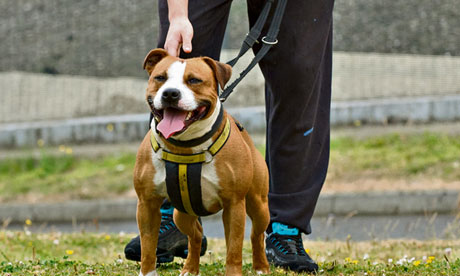How dogs are teaching young offenders new tricks
Abandoned dogs are being trained by prisoners for rehoming in the first project of its kind in the UK

Dog training at Polmont young offenders’ institution. Photograph: Scottish prison service
Just before 10am on a damp September weekday, a white van pulls into a yard at the rear of Polmont young offenders' institution near Falkirk. The young men who have been waiting for its arrival know the drill. They pick up harnesses and approach one by one. The side door opens and the first of the cages is unlocked. Out jumps a dog.
Tia, a stocky white and black crossbreed, is nervous around strangers, but when she spots Chris her tail starts windmilling. He slips the harness on her and leads her over to a patch of grass where she wriggles on to her back, tail still thumping, looking to be petted. "When I first met her she was quite scared," says Chris, 20. "But after you start working with her you get her to trust you."
Behind him, more dogs are greeting their handlers; six in all. They are led round to another yard where an agility course and other training areas have been set up on the grass.
Animals are occasionally used in prisons as pet therapy, but this is the first project in the UK where abandoned dogs are trained for rehoming by young offenders. Modelled on a US scheme, the Polmont project has been running since 2011, pairing dogs from rehoming centres run by theDogs Trust with Polmont's young inmates.
The programme, called Paws for Progress, is managed by Rebecca Leonardi. She helped to start it as part of her PhD in psychology and applied social science at Stirling University, and developed it with the Scottish prison service and the Dogs Trust. Leonardi had been aware of the success of similar programmes overseas and was surprised to find there was nothing similar in the UK.
Forty-eight young offenders have been involved in the programme so far. Of the 18 now back in the community, 10 have jobs, one is on a training scheme, another in college, four are seeking work and two are on work experience. Of the 101 dogs that have been through the programme, 91 have been successfully rehomed.
The inmates volunteer for the scheme, which runs in eight-week cycles. As well as training a dog, they work towards a series of qualifications including personal development, communications, numeracy and IT. Each young man prepares a canine CV, detailing their dog's development. The new owners often write back, letting them know how the dogs have settled in and what joy they bring.
"The lads work hard and they engage in education," says Julie Morrison, training and behaviour adviser at the Dogs Trust in West Calder. "They know how to build the dogs' confidence and how to build that confidence with themselves, and they leave here with something really positive for the future."
Morrison says the dogs are carefully chosen; those that the Dogs Trust feel could shine with the right training. At any one time there can be up to 11 dogs involved and most get two training sessions a week. Nervous dogs, says Morrison, have flourished with the Polmont young offenders.
At eight, Toby is the oldest dog in the group. A placid crossbreed, he drapes himself across his handler Jamie's legs during a break. "Before this, I used to be dead impatient, but you need a lot of patience to train the dogs so I think that's helped me with that," says Jamie, aged 20.
Toby is the seventh dog that Jamie has trained. "You do get attached to them and it's sad when they go," he says, "but it's better for them. To see the skills he gets makes you feel good about yourself."
Polmont's governor, Sue Brookes, is delighted with the programme. Many of the young offenders had frustrating experiences of education, which impacted on their behaviour, she says, but the project has shown them that learning can be positive.
"The development of mature and positive attitudes among the young men is clearly evident as they take part," she says. "By delivering valuable qualifications, Paws for Progress contributes significantly to the learning environment at Polmont."
Some of the inmates, such as David, are keen to continue working with dogs when they are released. David is known for his knack with them. The dogs, for him, bring a sense of purpose and comfort. "It's like getting back to some kind of normality," he says.
The project has attracted interest from other prisons, but Leonardi is wary of saying it is something that the Dogs Trust could or should roll out across the sector.
"We are not under any illusion that this is a miracle cure," she says. "It is not the case that you could just pick up this model. This is very specific to these guys. I think it's important that people who see what we do here don't just think this should be everywhere. It's a complicated thing."
But she has been heartened by the impact on those who have taken part.
"We will be able to monitor rates of reconviction for our group, but it is difficult to interpret from that or compare with the national average. All the boys have wanted to stay in touch because of the relationships they have with the dogs. With something like this you can just make that spark that can then carry them forward."
When the session ends, the young offenders are called to bring their dogs to the van. Most of the dogs go willingly, but Diesel, an English bulldog, hangs back with his handler, 19-year-old Kev. "When he first came here he was a bit snappy and I wouldn't put my hands near him, but not now. He's a great dog," he says.
Kev will be released in four months. If Diesel hasn't been rehomed in that time, he is thinking of applying to take him on. "I love the dog," he says. "Hopefully, he'll still be here and I can have him."

No comments:
Post a Comment